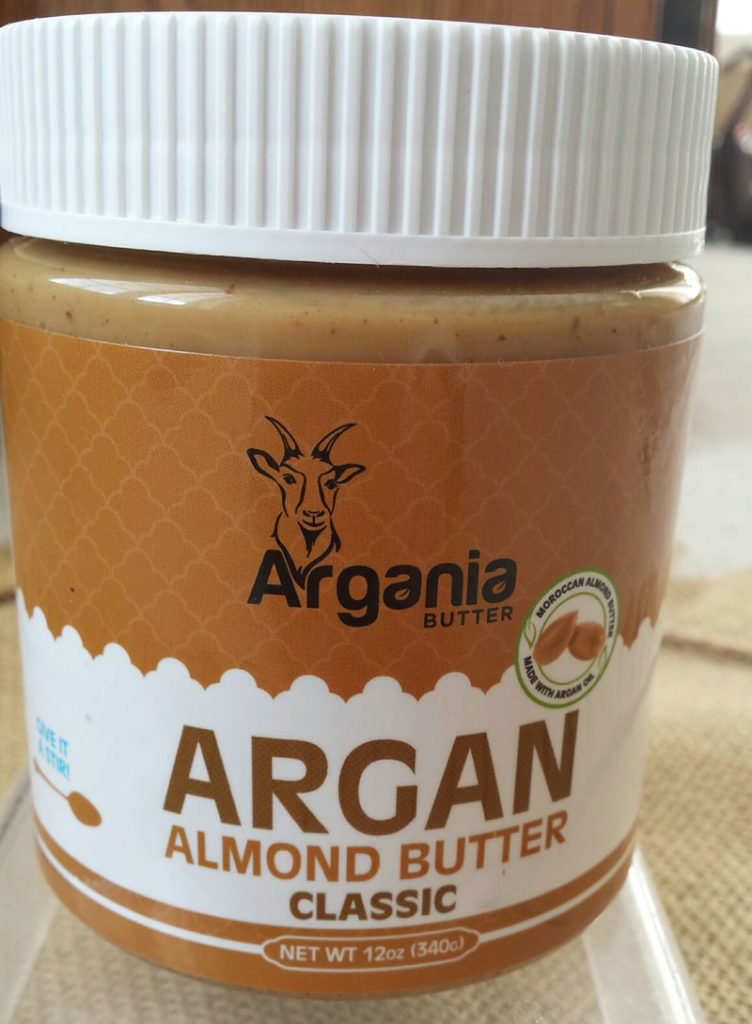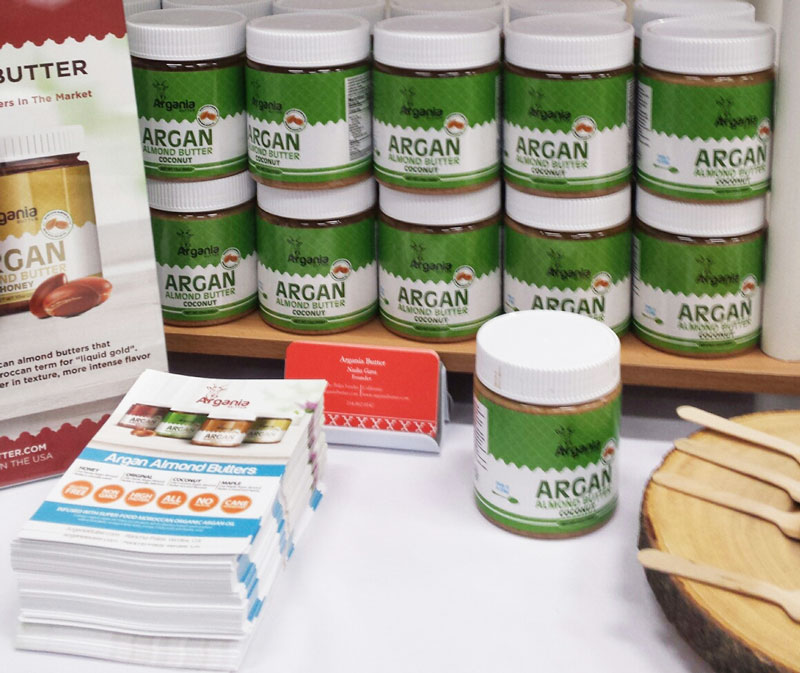
What the Heck is Argan Oil?
Argan oil may be a well-known all-natural beauty product for healthy skin and hair. But what about argan oil in the kitchen? Its culinary uses are becoming more evident as I discovered at the Natural Products Expo West Show in California in March. I’m new to argan oil as a food ingredient and I’m enjoying the Classic Argan Almond Butter from Argania Butter. A 12 ounce (340 mL) jar sells for $11.99 USD. The taste is rich and earthy. The texture is typical of an all-natural nut spread. Let’s learn more about the food and health benefits of what the heck is argan oil.
Where does it originate?
Argan oil is produced from the kernels of the argan tree, which is grown almost exclusively in the south-western region of Morocco. According to an article that was published in the Daily Mail UK (1), producing 1 L of oil would take approximately five stone of fruit and 15 hours of labour. The workers (mostly women) would collect the argan fruit, extract the nuts, then crack them to reveal the kernels and then cold-pressing the kernels to produce oil.
Goats love argan fruit and have always been a vital element in the fertilization of the argan trees. In Morocco where the trees grow, goats are encouraged to climb, dine and deliver the seeds to earth. Today, due to its demand both topically (hair, skin, wound healing) and as a food ingredient, it’s processed, exported and sold worldwide.
Argan Oil and Health
Bone Health
Consuming argan oil may improve clinical symptoms of knee osteoarthritis. A study that was published in the journal of Current Rheumatology Reviews in 2017 consisted of 100 patients who were randomly assigned to two groups: the treatment group (i.e., to consume 30 ml of argan oil per day) or a control (i.e., with no treatment) for eight weeks (2). The patients also completed a series of tests (i.e., the visual analogue scale for pain, walking perimeter, the Western Ontario and McMaster Universities osteoarthritis index and the Lequesne index) before and after. The results showed that the treatment group had a very significant decrease or an improvement in all of the tests.
Heart Health
Using argan oil for cooking and baking may have potential heart health benefits. Consuming argan oil can help reduce cholesterol levels, therefore promoting heart health. A systematic review and meta-analysis that was published in the journal of Phytotherapy Research in 2018 consisted of five trials with 292 participants (3). The results showed a reduction in the following: total cholesterol, low density lipoprotein cholesterol, and triglycerides as well as an increase in high density lipoprotein cholesterol.
Immune Health
Argan oil has numerous antioxidants, therefore has potential anti-cancerous properties. According to an in vitro study that was published in 2006, argan oil could have anti-cancerous properties (4). The study included the preparation of three human prostate cell lines and observed the activity of tocopherols (obtained from virgin argan oil) and saponins (extracted from argan press cake). The results showed that tocopherols and saponins demonstrated cytotoxic activity and exerted an inhibitory effect on the proliferation of the three prostate cell lines.
What’s Next?
There is clinical evidence of argan oil’s health benefits but further research is necessary to confirm the causal relationship of the ideal daily dosage in both well and people with diseases. Also, one possible concern of argan oil is that the argan nut is a type of nut, which could pose a problem for those who have an allergy to tree nuts or peanuts (5). Overall, I like this unique “new to the food marketplace” ingredient and believe argan oil has numerous potential health benefits to be confirmed and discovered.
I’d love to assist your marketing and product development teams to get into the latest
better-for-you food trends or speak at your upcoming event to share my experience as a
food expert and entrepreneur.
Click here to learn more.
References
- Dunbar P. Miracle or snake oil? Celebs swear by it. Beauty brands put it in everything. But is wrinkle-busting argan oil all it seems? Daily Mail UK. 2016. Retrieved from: http://www.dailymail.co.uk/femail/article-3451937/Miracle-snake-oil-Celebs-swear-Beauty-brands-wrinkle-busting-argan-oil-seems.html
- Essouiri J, Harzy T, Benaicha N, Errasfa M, Abourazzak F. Effectiveness of argan oil consumption on knee osteoarthritis symptoms: A randomized controlled clinical trial. Current Rheumatology Reviews. 2017; 13(3): 1-6.
- Ursoniu S, Sahebkar A, Serban M, Banach M, Lipid and Blood Pressyre Meta-Analysis Collaboration Group. The impact of argan oil on plasma lipids in humans: Systematic review and meta-analysis of randomized controlled trials. Phytotherapy Research. 2018; 32: 377-383.
- Drissi A, Bennani H, Giton F, Charrouf Z, Fiet J, Adlouni A. Tocopherols and saponins derived from Argania spinose exert, an antiproliferative effect on human prostate cancer. Cancer Investigation. 2006; 24: 588-592.
- Can people with peanut allergies eat argan oil? A & CI and Associates. 2014. Retrieved from: https://www.allergyclinical.com/blog/can-people-with-peanut-allergies-eat-argan-oil/
Copyright © 2018 Jane Dummer | All Rights Reserved


